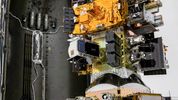- On the back of NASA and Space X’s successful historic Crew Dragon mission, Morgan Stanley published a bullish update on SpaceX this week, a follow-up to their $1 trillion space economy forecast three years ago. The report suggests that SpaceX could become the most valuable company in the world, worth $175 billion vs the current private valuation of $36 billion if the company succeeds in the New Space race. Adam Jonas, the analyst, highlighted growing investor interest in space on a conference call this week.
- Jonas believes that SpaceX could dominate the entire ecosystem: from Launch, Connectivity to Deep Space Exploration. Starlink, the company’s ambitious mega-constellation broadband network, is the key value driver for SpaceX. Morgan Stanley’s base case valuation for SpaceX is $50 billion. This assumes the company can drive launch costs down to $5-7 million and user terminals to $100 by 2024 (vs $1,000+ today) in order to sign up 300 to 700 million subscribers at an ARPU of $25 per month.
- The huge potential upside is not without risks. SpaceX will need to overcome challenges, including significant funding to build out the Starlink network ($170 billion), affordable user terminals and intense competition from other Low Earth Orbit or LEO (OneWeb, Amazon and Telesat) and Geostationary (GEO) constellations. Over the next few years, satellite communications capacity could grow 20x with next-gen GEO satellites such as ViaSat 2 and 3 coming online. Although LEOs such as Starlink will likely struggle to compete against high-throughput GEOs on a cost per Gbps basis, industry experts believe the future of satcom will be a hybrid of geostationary and non-GEO satellites with LEOs providing high speed consumer broadband, mobile backhaul and enterprise VSAT. Lower cost bandwidth will drive new business models and applications. Recent UK government’s acquisition of a stake in OneWeb out of bankruptcy also shows growing government interest in supporting LEO constellations for national security and rural area broadband connectivity.
- At Seraphim Capital, we share Morgan Stanley’s enthusiasm for Space and look forward to supporting and financing the growth of future market disrupters. The Seraphim Space Camp helps startups accelerate commercialization with corporate and government partners. While Seraphim Space Fund is focused on investing in companies enabling the New Space Economy and transforming global industries. Our portfolio consists of five satellite constellations delivering capabilities from precise GPS, quantum security, Synthetic Aperture Radar (SAR), weather to maritime and aviation tracking. (Xona Space, ArQit, ICEYE and Spire) Other portfolio companies LeoLabs and D-Orbit ensure safe “in-space” operations by providing space situational awareness and transportation and debris removal.
 unknownx500
unknownx500











